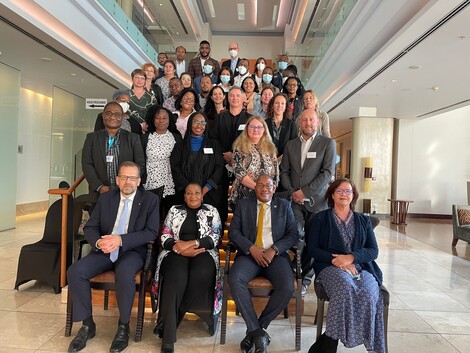TwiNit 2.0
Namibia-RKI Twinning Project – The next phase in the establishment of the Namibia Institute of Public Health
Duration: 2023 - 2025
Partner country: Namibia
Partner institutions:
- Ministry of Health and Social Services (MoHSS), Namibia
- University of Namibia (UNAM), Namibia
- Namibia Institute of Pathology (NIP), Namibia
- Friedrich-Loeffler-Institut (FLI), Germany
- Research Center Borstel (FZB), Germany
Involved RKI units: ZIG 1, ZIG 4, Unit 31, Unit 37
Latest updates: Namibian delegation attends World Health Summit and meets with partners in Berlin
 Stakeholder meeting in Windhoek, May 2022. Source: RKI
Stakeholder meeting in Windhoek, May 2022. Source: RKI
Challenges addressed by the project
Namibia faces a number of public health (PH) challenges which threaten the health security of the country. Establishing a well-functioning Namibia Public Health Institute (NamPHI) would help to consolidate PH functions at the national level as well as subnational levels, and would be bringing together data and expertise to coordinate PH efforts across sectors.
Objectives
The project goal is the establishment of the Namibia Public Health Institute (NamPHI), which is a complex endeavor that requires the expertise and support of many technical areas. Therefore, TwiNit 2.0 is a compilation of various projects under one umbrella bringing in interdisciplinary technical support in a cross-department cooperation. It will include the following technical areas and objectives:
- Epidemic preparedness and response: to strengthen the capacities of the MoHSS to prepare for, detect and respond to outbreaks of infectious diseases incl. the national Public Health Emergency Operations Centre (PHEOC) as the main coordinating body in outbreak situations.
- Surveillance and health information systems: to support the establishment of an integrated health information systems (HIS) in Namibia, based on the currently used District Health Information System-2 (DHIS-2) on all levels; and the analysis and reporting of relevant data.
- Non-communicable diseases (NCDs) & mental health (MH): to support the MoHSS activities aimed at strengthening NCDs and MH prevention and control through improved and integrated surveillance, and through an update of the national NCD strategy and the conceptual integration of NCDs and MH into the NamPHI.
- Public Health laboratory support: to establish a national laboratory system in Namibia that will provide the future NamPHI with laboratory data to guide evidence-based health policies and to strengthen the diagnostic and molecular laboratory based-surveillance system in Namibia.
- Antimicrobial resistance & Infection Prevention and Control: to support Namibia in combatting antimicrobial resistance and promoting infection prevention and control.
Overview of activities
TwiNit 2.0 will support different steps in the establishment of NamPHI incl. determining the needs and gaps to be addressed by it, defining its Public Health core functions, identification of needed resources, conducting stakeholder meetings and other outreach activities and developing the institutional and legal frameworks for it.
- Epidemic preparedness and response: The cooperation will primarily focus on the development and implementation of guidance for the PHEOC, such as a handbook and Standard Operating Procedures (SOPs). Following their development and approval, they will be integrated into the respective work practices through training and potentially later be tested through simulation exercises and consequently optimised.
- Surveillance and health information systems: The current HIS will be mapped and evaluated. This data and a series of stakeholder consultations will be used to build up a comprehensive roadmap for the establishment of DHIS-2 as the primary HIS in Namibia. A DHIS-2 expert will be consulted and engaged. Finally, the new HIS will be piloted in at least one health district.
- Non-communicable diseases (NCDs) & mental health (MH): One staff and technical support will be provided to the relevant MoHSS program for 1) updating the national NCD strategy, 2) to participate in the conceptual development towards NamPHI, 3) to strengthen the HIS in the area of NCDs and MH to guide action and policy advice.
- Public Health laboratory support: The focus is on 1) transition of implemented molecular laboratories from SARS-CoV-2 to other pathogens (incl. zoonotic pathogens) and integration of diagnostic data into surveillance data at a national level, 2) extension of genomic sequencing and data analysis capacities, 3) cross sectoral laboratory related trainings and capacity building through applied research support and 4) technically advising the establishment of a network of reference laboratories.
- Antimicrobial resistance & Infection Prevention and Control: This will include 1) advising the MoHSS in building a One Health AMR Multisectoral Working Group for Namibia and to 2) support the analysis of AMR data from the Namibia Institute of Pathology (NIP) with a student fellowship program.
One Health activities as a cross-cutting topic will be implemented in close collaboration with Friedrich-Loeffler-Institute, Research Center Borstel and Namibian partners.
to the top




